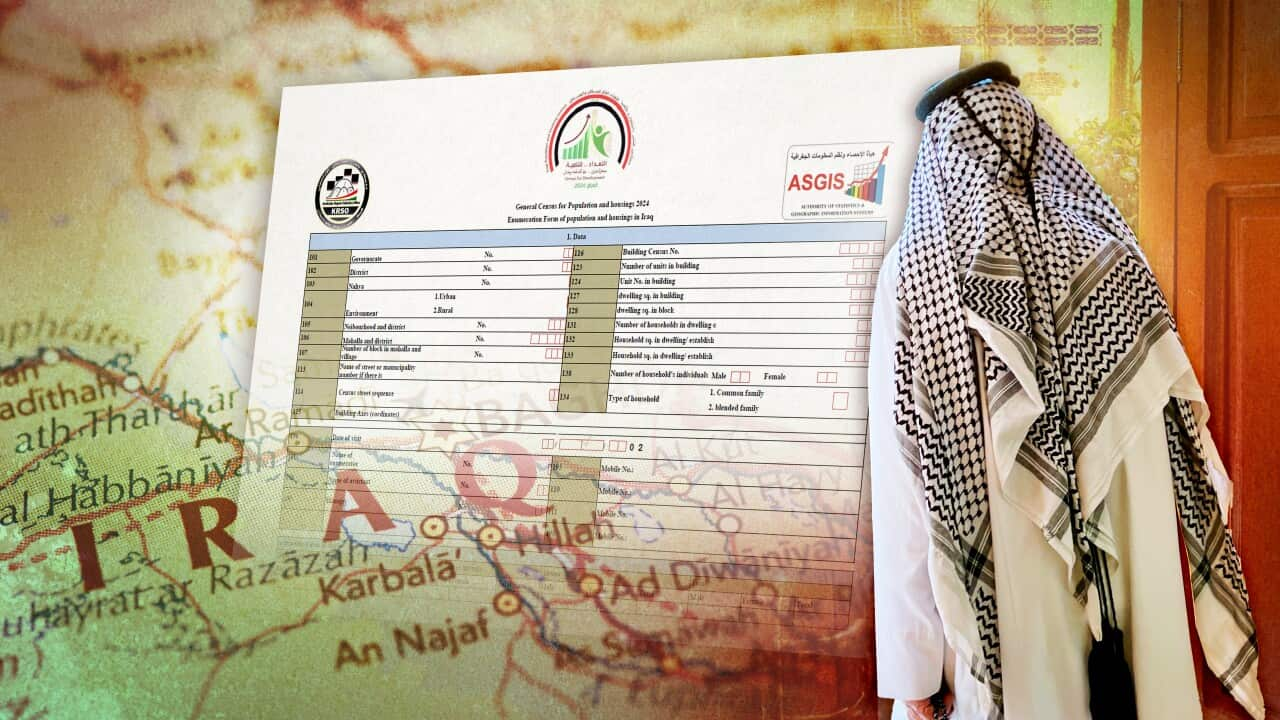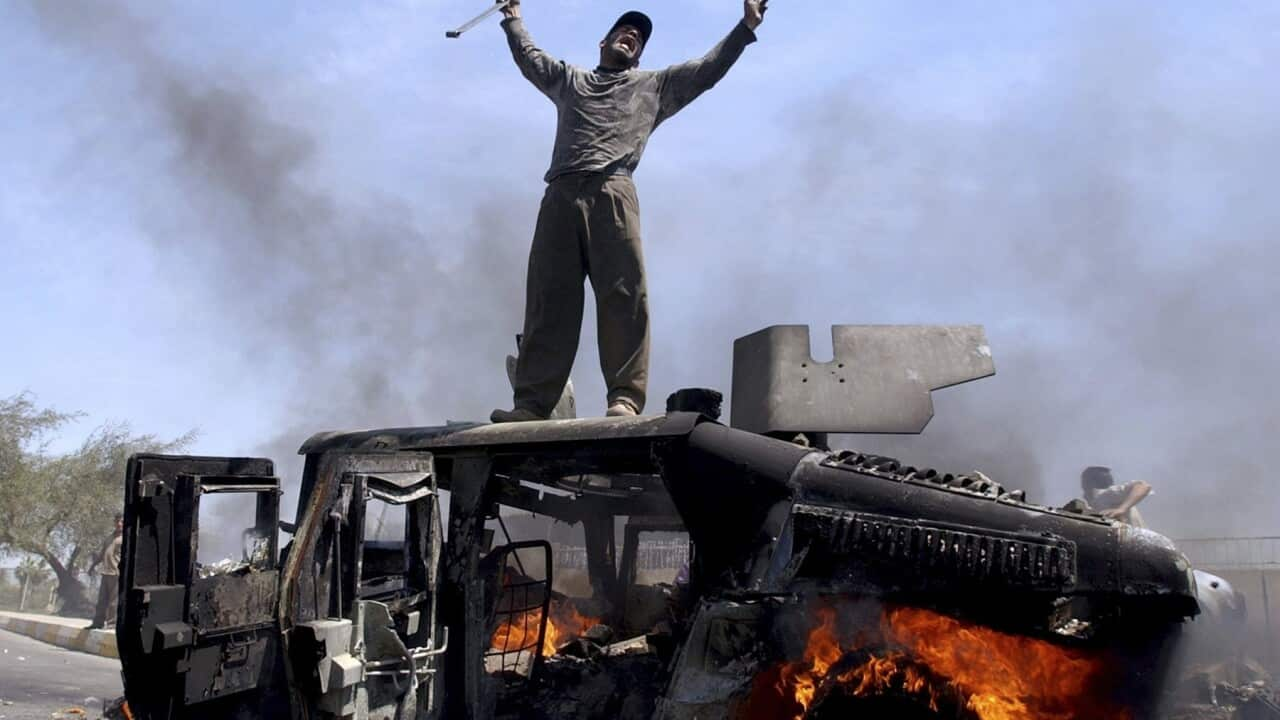Key Points
- Iraq's first census in almost three decades will involve more than 120,000 surveyors and a two-day curfew.
- Despite official assurances, members of minority groups suspect data will be used to further marginalise them.
- Previous attempts to hold the census were thwarted by war, civil unrest and the pandemic.
A curfew is set to be imposed in Iraq’s 18 provinces on November 20 and 21 as residents are surveyed for the country’s first population census in almost three decades.
More than 120,000 field researchers will go door to door collecting data via electronic tablets from households in a process supported by United Nations.
While it’s being touted as a way to assess migration patterns and plan for the future, some experts say the data collected may marginalise minority groups further.

Iraq shares a land border with six other countries in the Middle East.
Questions identifying an individual’s ethnicity, language spoken at home, and ancestry have not been included, sparking concerns among members of Iraq’s Kurdish and Assyrian minorities based in Australia.
Sydney academic Dr Michelle Shamoell believed the census exercise was "deceptive" and "disappointing" due to the ommitance of questions about ancestry or languages spoken at home.
Dr Shamoell, who grew up in an Assyrian-speaking household, said she experienced a "forceful change of identity” during the 1987 census.
"At primary school, our teacher asked us to put our ethnicity as 'Arab' (in the census). I argued with her and told her 'I am not an Arab, I am Assyrian and have my own language and culture'," Dr Shamoell told SBS Assyrian.

Dr Michelle Shamoell. Credit: Supplied
"As a teenager, I was very upset and disappointed feeling that my identity was stolen from me and falsified in the records."
In past censuses, minorities such as Assyrians were not separately identified but grouped into a category for 'Christians'.
The country had held eight population censuses up to 1997, before several postponements, most notably in 2017 due to tensions over disputed territories.
The most recent census was held in 15 Iraqi provinces excluding the three northern provinces that make up the semi-autonomous Kurdistan Region, which had been designated as a no-fly zone by the coalition forces led by the US.
The answers that the census would garner were vital for future government planning, deputy minister of planning and acting head of the Kurdistan Region Statistics Office Sirwan Mohamed told SBS Kurdish.

Deputy minister of planning and acting head of the Kurdistan Region Statistics Office, Sirwan Mohamed. Credit: Supplied
He said such a question may also have resulted in the Kurds being divided into a range of other minority groups including Yazidis, Failys and Shabaks.
"This is not accepted because it will divide the Kurds and have a negative impact on their (overall) situation," he said.
Saman Noah, a journalist from the Kurdistan Region, told SBS Arabic that the community's concerns stemmed from the oil-rich Kirkuk region and the other disputed areas between Arabs and Kurds.
"Kurdish circles, whether political or social, have concerns and many fears regarding the census, especially in the disputed areas, whether in Kirkuk or Sinjar, and they hope that the census results will not be used for political purposes," Noah said.
The only goal of the census was to "build a development database" and it was not connected to Article 140 of the Iraq Constitution which addressed disputes over land borders, Iraqi Ministry of Planning's spokesperson for the census team, Abdul Zahra al-Nadawi told SBS Arabic.
'Arabisation' impact on census
Adelaide-based academic Dr Sherko Kirmanj said Kurdish people in Iraq were concerned about the impact on collected data of the estimated 600,000 Arabs who now lived in and around disputed territories.
"Once they are registered in the forthcoming census, they will be acknowledged as inhabitants of these contested areas, which could have a considerable effect on the results of any future referendum, as stipulated in the Iraqi Constitution, regarding the status of these territories," Dr Kirmanj told SBS Kurdish.
"This potential impact has raised apprehensions within Kurdish communities. Consequently, there are demands for the Kurdistan Regional Government (KRG) to abstain from participating in the census until the full implementation of Article 140 of the constitution is achieved.
"This entails the normalisation of the disputed areas, facilitating the return of Kurds and Turkmen to their ancestral lands, and addressing the 'Arabisation' process that previously led to the influx of Arab populations into these regions."
He said the removal of the ethnicity question was concerning for many Kurds who feel the absence may "overlook their distinct national identity and could potentially limit the recognition of their linguistic and cultural rights".

Adelaide-based academic, Dr Sherko Kirmanj. Credit: Supplied
"Given the ongoing 'Arabisation' policies over the last two decades, Kurds are concerned that this census may similarly be used in ways that could limit their national and territorial identity rights."
'One Iraq'
Mission Head/Acting Charge d'Affaires at the Republic of Iraq's embassy in Australia, Ya'rub Al-Anbaki said the "census did not ask about race or ethnicity in order to avoid sectarianism that fragments societies".
"In addition, we intend to establish the concept of Iraqi citizenship, which is the broader and more comprehensive term, under the name of one Iraq, with all its ethnicities, sects, and religions," he said.
"As we have illustrated, this does not eliminate an individual's ethnic or religious identity, but rather enhances it with a broader name and highlights the sources of strength of a diverse society."
Al-Anbaki said the importance of the census lay "in the fact that it will provide the country with up-to-date statistics regarding the databases it needs".
"It will also serve as a basic reference for the government's development plans, and the lack of these statistics will adversely affect these plans and their orientations towards economic and living prosperity, and if it is not conducted, access to official data will be extremely difficult to achieve," he said.
He said Iraqis visiting Australia during the census or having Australian citizenship would not be able to participate as "the 2024 population census will only include Iraqis living inside Iraq".









